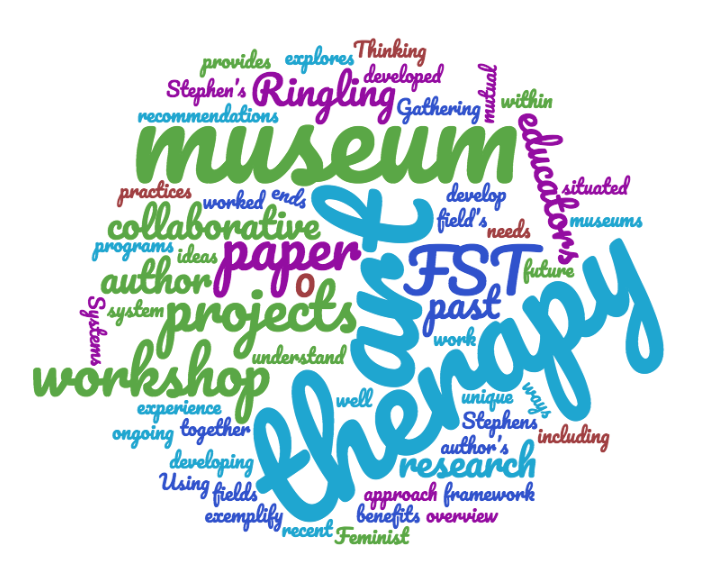Art Therapy at The John and Mable Ringling Museum of Art: A Feminist Systems Thinking Approach to Art Therapy and Museum Collaboration
Keywords:
art therapy, museum, museum education, systems, Feminist Systems ThinkingAbstract
Using Stephen’s (2011) Feminist Systems Thinking (FST) as a framework, this paper explores the mutual benefits of collaborative practices between the fields of art therapy and museum work. To exemplify the ways in which art therapy and museums are situated within FST, this paper provides an overview of past and ongoing art therapy museum programs and research projects, including a recent art therapy workshop developed by the author and museum educators at the Ringling Museum. To develop the workshop, the author and the museum educators worked together to understand each field’s unique system and needs. Gathering from the author’s experience developing the art therapy workshop at the Ringling, as well as research from past art therapy and museum projects and Stephens (2011) FST approach, this paper ends with recommendations and ideas for future collaborative art therapy and museum projects.
References
American Art Therapy Association. (2016). What is art therapy? Retrieved from http://www.arttherapy.org/upload/whatisarttherapy.pdf
Bethlehem, R. A., Allison, C., van Andel, E. M., Coles, A. I., Neil, K., Baron-Cohen, S. (2016). Does empathy predict altruism in the wild? Social Neuroscience, 1-8.
doi: 10.1080/17470919.2016.1249944
Betts, D. J., Potash, J. S., Luke, J. J., & Kelso, M. (2015). An art therapy study of visitor reactions to the United States Holocaust Memorial Museum. Museum Management and Curatorship, 30(1), 21-43.
Kletchka, D. C. (2007). Moralizing influences: The feminization of art museum education. In P. Villeneuve (Ed.), From periphery to center: Art museum education in the 21st century (pp. 74-79). Reston, VA: National Art Education Association.
Linesch, D. (2004). Art therapy at the Museum of Tolerance: Responses to the life and work of Friedl Dicker-Brandeis. The Arts in Psychotherapy, 31, 57-66.
Love, R. A. & Villeneuve, P. (2017). Edu-Curation and the Edu-Curator. In P. Villeneuve & A. R. Love (Eds.), Visitor-Centered Exhibtions and Edu-Curation in Art Museums (pp. xx-xx). Lanham, MD: Rowman & Littlefield.
Peacock, K. (2012). Museum education and art therapy: Exploring an innovative partnership. Art Therapy, 29(3), 133-137.
Peacock, K., Hamil, S., & Dumlao, K. (2014). Art therapy access programs. Retrieved from www.brooksmuseum.org/assets/2259/art-therapy-in-museums-memphis.pdf
Rowson Love, A. & Thomas-Zaremba, M. (2015). Perceptions of our museum: Older adult experiences as volunteers. In H. L. Robertson (Ed.), The caring museum: New models of engagement with ageing (pp. 132- 169). Cambridge, MA: MuseumsEtc Ltd.
Scheff, J. & Kotler, P. (1996, January-February). How the arts can prosper through strategic collaborations. Harvard Business Review. Retrieved from https://hbr.org/1996/01/how-the-arts-can-prosper-through-strategic-collaborations
Silverman, L. H. (2010). The social work of museums. New York, NY: Routledge.
Simon, N. (2010). The participatory museum. Santa Cruz, CA: Museum 2.0.
Stephens, A. (2011). Feminist systems thinking: The effectiveness of practicing the principles. Proceedings of the 55th Annual Meeting of the International Society for the Systems Sciences. Symposium held at the University of Hull Business School, Hull, UK.
The John and Mable Ringling Museum of Art. (n.d.) The Ringling 2014-2015 Annual Review. Sarasota, FL: The Ringling.
The Ringling. (2016). The Ringling. Retrieved from http://www.ringling.org on November 16, 2016
Treadon, C. B., Rosal, M., & Wylder, V.T. (2006). Opening the doors of art museums for therapeutic processes. The Arts in Psychotherapy, 33, 288-301.
doi: 10.1016/j.aip.2006.03.003
Weil, S. E. (2002). Making museums matter. Washington, DC: Smithsonian Institution.

Downloads
Additional Files
Published
Issue
Section
License
Authors who publish with this journal agree to the following terms:- Authors retain copyright and grant the journal right of first publication with the work simultaneously licensed under a Creative Commons Attribution License that allows others to share the work with an acknowledgement of the work's authorship and initial publication in this journal.
- Authors are able to enter into separate, additional contractual arrangements for the non-exclusive distribution of the journal's published version of the work (e.g., post it to an institutional repository or publish it in a book), with an acknowledgement of its initial publication in this journal.
- Authors are permitted and encouraged to post their work online (e.g., in institutional repositories or on their website) prior to and during the submission process, as it can lead to productive exchanges, as well as earlier and greater citation of published work (See The Effect of Open Access).

